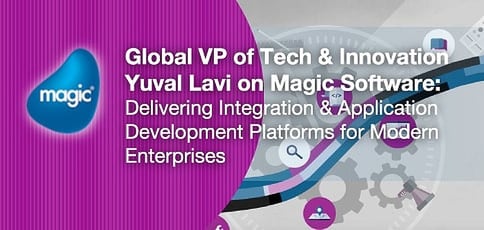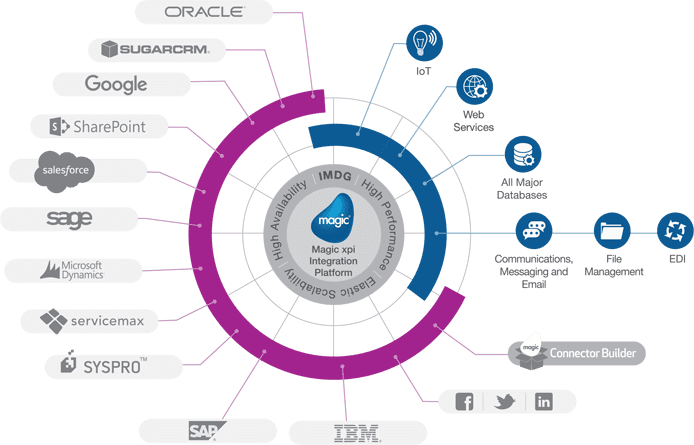
TL; DR: Magic Software provides a wide range of IT products and services to clients in more than 50 countries around the globe. As part of the larger Magic Group, Magic Software assists clients in developing, deploying, and integrating smarter business technology that strengthens performance, shortens development cycles, and increases returns on investment. We recently caught up with Global VP of Technology and Innovation Yuval Lavi, who gave us the scoop on Magic’s Integration and App Development Platforms built specifically for the modern enterprise.
With a population of just over 9 million, Israel is home to an impressive number of highly successful IT and software enterprises. In fact, the country is often referred to as the “startup nation,” reflecting its rich history of entrepreneurship and tradition of embracing new technology.
In the 1980s, business partners David Assia and Yaki Dunietz launched Mashov Computers as a business software company, and it quickly gained traction in Silicon Wadi — Israel’s version of Silicon Valley. From there, the duo founded Magic Software and, in 1983, released Mashov Software Export (MSE), a precursor to Magic Software’s current development platform.
MSE/Magic was designed as a simplified IDE for businesses to generate and deploy applications more effectively. At a time when coding was more of a niche specialty, businesses would rely heavily on dedicated development teams for software that was absolutely essential to business operation. Not only did this significantly increase costs, but these companies were sometimes left with tricky applications that were difficult to update and integrate with new and old software. In addition, the development life cycle was notably longer due to a lack of suitable IDEs. Thus, MSE/Magic was destined to be a game changer for many global businesses.
As Yuval Lavi, Magic’s Global VP of Technology and Innovation, told us, the release of MSE made application development accessible to a much broader audience due to its low-code interface.
“Magic actually started as a development platform for what was then known as a non-developer,” he said. “The only thing you had back then was C — not even C++ or Basic — and you really needed to write a lot of code just to say ‘Hello World.’”

Magic Software’s Yuval Lavi told us the company is committed to delivering a broad range of IT software and solutions.
With instantaneous debugging and no need for compiling, MSE quickly caught on as a “magic” software development solution for creating and deploying mission-critical apps.
By the 1990s, Mashov Computers — soon renamed to Magic Software Enterprises — had gained the attention of the Israel Defense Forces, as well as several software giants like IBM. In the following decades, Magic Software would introduce a number of products designed to streamline both development and integration. This simplification would lead to higher ROIs as well as smoother overall business operations for hundreds of global clients.
Simplifying Business Processes With Better App Integration
Software development encompasses not only the original creation of an app, but also its continued improvement. Because this process is cyclical, new versions of an app are expected to maintain compatibility with existing systems. As such, integration is extremely important to ensure consistency and make implementation easier.
With this in mind, Magic released its own integration platform in 2003 to address business challenges related to automation, efficiency, and data consolidation. In the pre-cloud era, synchronizing data and implementing automated processes was a much trickier task, especially with the rising popularity of BYOD and remote work — and, thus, a severe lack of uniform compatibility. With its more general development platform achieving widespread adoption, Magic’s focus on integration in the early 2000s would be a game changer for companies relying on multiple vendors and struggling to keep their software in tune with shifting industry demands.
The Magic xpi Integration Platform was designed as a robust and easy-to-use solution for improving interoperability between diverse systems and platforms across the enterprise. While striking this balance was a challenge, Magic’s Integration Platform was able to satisfy both the desires of business owners seeking an easy and cost-effective solution, as well as the more complex needs of developers.
“Typically, a good developer likes to make things complicated,” Yuval said. “On the other hand, if you’re talking to the business owner, they want things to be as simple as possible.”
A Low-Code Interface That Makes Development More Accessible
Traditional programming eats up significant time and requires many lines of code — all of which must be flawless for the program to even run properly. A minor misspelling or syntax error can very easily break mission-critical apps. As a result, the use of a simplified IDE not only speeds up the development process, but also puts the minds of business operatives at ease.
The current incarnation of the Magic xpa Application Platform is compatible with most standard databases and gives businesses the competitive edge by streamlining the deployment of CRM, ERP, and other software across mobile, desktop, and web platforms.
“Our time to market is very fast,” Yuval said. “We enable businesses to react fast to changes, both with integration and within the application.”
Companies worldwide rely on Magic’s code-free platform to create agile and platform-agnostic software that not only saves time and money, but also improves overall business performance. Based on Microsoft’s Visual Studio, Magic xpa features a drag-and-drop interface complete with pre-defined elements and thoroughly tested blocks of code.
When an application is finalized, it can then be automatically ported to Windows, Linux, and other popular platforms with a few simple clicks. Normally, the entire app would have to be rewritten to accommodate vastly different architectures. Since Magic requires only a single, simple skill set to create powerful and flexible applications, business owners are able to sidestep some of the most common technical roadblocks to success while focusing on business logic instead.
Streamlining Dev Life Cycles With Rapid Cross-Platform Development
Throughout its 35 years in business, Magic Software has released a number of tools for integration and development. Similar to its xpa and xpi platforms, Magic’s xpc iPaaS is a cloud-based, code-free solution. With enhanced security and off-premises hardware management, businesses experience peace of mind when connecting ecosystems and syncing databases.
Built-in connectors are included for Salesforce, Magento, and SharePoint, among others.
“The most important features of your application are functionality and adaptation,” Yuval said. “With our cloud offering we suspect that you can actually get your business app up and running in just a few days.”
For example, Magic xpc can connect Salesforce and Magento to automatically generate cross-platform leads and log customer order details.
Complimenting Magic Software’s versatile toolset are its professional service offerings which further simplify the creation and use of business software. With operations in over 50 countries, Magic is able to provide localized expertise to businesses that need it the most.
Meanwhile, an extensive knowledgebase combined with time-tested methodologies ensures faster time to market as well as smarter management for resources and customers. To make these services more accessible, Magic offers a variety of flexible pricing models based on time, fixed prices, and outsourcing, among other factors.
Up Next: Increased Integration Capabilities and Functionality
Businesses rely on intuitive and flexible applications, which is why development life cycles must never sit stagnant. As new technologies and operating systems rapidly evolve, the traditional methodology of constantly rewriting these essential apps — sometimes even from scratch — is often frustrating, even for hardcore developers. To help more companies create future-proof applications, Magic Software plans to add even more capabilities for integration and development in the near future.
Throughout its 35 years in business, Magic Software has helped businesses adapt to such technological advancements as the emergence of mobile platforms and the arrival of cloud-based web applications. Looking ahead, Yuval cited AngularJS as the company’s next big focus.
“We’re coming out with our Angular client within the next few months,” he said. “Over the years, we’ve gone from DOS to Windows, the web, and mobile systems. Now, we feel that Angular is mature enough to provide us with all the functionalities we’d like to give to our customers.”
Angular is an up-and-coming JavaScript-based framework described as the “HTML of web applications.” Partially maintained by Google, Angular allows for the creation of more dynamic web applications than its traditional single-page counterparts.
With an extensive history of helping other businesses succeed, Magic has clients in a broad range of industries, from healthcare and financial to construction and advertising. Working closely with 3,000-plus software partners, Magic seeks to alleviate the common headaches of business software development and management — thereby transforming a normally tedious and highly technical task into one that works like magic.
HostingAdvice.com is a free online resource that offers valuable content and comparison services to users. To keep this resource 100% free, we receive compensation from many of the offers listed on the site. Along with key review factors, this compensation may impact how and where products appear across the site (including, for example, the order in which they appear). HostingAdvice.com does not include the entire universe of available offers. Editorial opinions expressed on the site are strictly our own and are not provided, endorsed, or approved by advertisers.
Our site is committed to publishing independent, accurate content guided by strict editorial guidelines. Before articles and reviews are published on our site, they undergo a thorough review process performed by a team of independent editors and subject-matter experts to ensure the content’s accuracy, timeliness, and impartiality. Our editorial team is separate and independent of our site’s advertisers, and the opinions they express on our site are their own. To read more about our team members and their editorial backgrounds, please visit our site’s About page.

